Words of Wisdom - Shastra
& Shastrakaras speak
For Books and shastra downloads see Main Index, under
Books:
Om Namo Bhagavate Vasudevaya
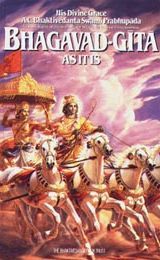

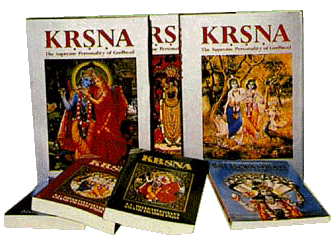
The Complete Works of Srila Prabhupada
All the books, the letters and conversations at your
fingertips
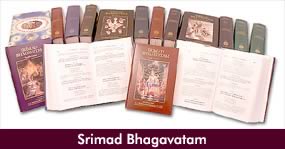
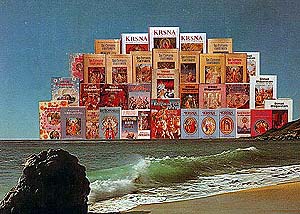
All Srila Prabhupada's books and more on one disk
http://www.vedabase.com




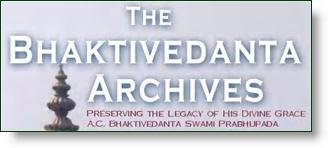
Srila Prabhupada's Audio lectures to listen to on-line:
http://www.hare-krishna.org/srila-prabhupada-lectures.htm
Listen to Srila A.C. Bhaktivedanta Swami Prabhupada on-line
- all 900 of his lectures are available HERE:
http://www.prabhupadavani.org/
Srimad Bhagavatam - the entire lecture series listen and
read along on-line - Narrated by Amala Bhakta dasa:
http://www.prabhupadavani.org/SB_index.html
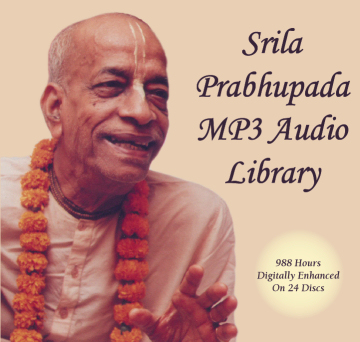
The new enhanced Prabhupada MP3 series
http://www.prabhupada.com/store/store.php?page=product.php&id=MP3AUDIOLIB

Srila Prabhupada Vyasa-puja book 2007
http://www.krishna.com/node/1048
Vyasa-puja is an annual celebration by the devotees of Lord Krishna
to offer homage to their guru, or spiritual teacher.
There are two versions of the Vyasa Puja Book based on the speed of
your internet connection.
If you are unable to open the file, download Acrobat Reader.
High speed connections, with pictures.
Vyasa-puja
Book 2007 [PDF/ZIP, 2.11MB]
Low speed connections, no pictures.
Vyasa-puja
Book 2007 (no pictures) [PDF/ZIP, 2.11MB]








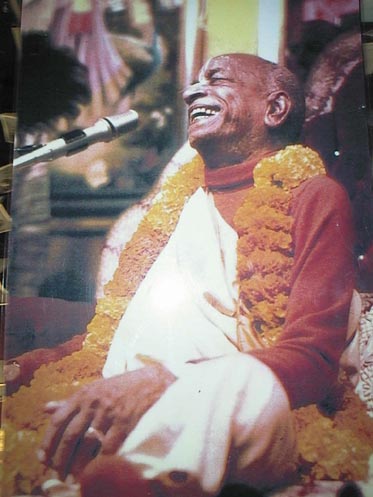
Visit "Prabhupada Connect" for all manner of Prabhupad
Nectar:
http://www.prabhupadaconnect.com/Index.html
Srila Prabhupada's Final Lesson Video - Downloadable and
viewing on-line
http://users.iskconludhiana.com/images/thumbnails.php?album=21


All Srila Prabhupada's original books
available for sale here.

Download all the Hare Krsna teachings which includes
all Vaisnava and
Vedic concepts by visiting one of the sites listed at
the following address.
http://www.geocities.com/suci123/bookdownloadsites1.html
The Bhaktivedanta Book Trust
Srila Prabhupad Memorial Library
http://www.krishna.com/main.php?id=33


33 Books Online Including Srimad Bhagavatam!
http://www.geocities.com/freeprabhupadabooks
The compressed "self extracting" file mentioned is now currently
available for download
http://www.krsnaconsciousness.org/Gauranga/Folio/BhaktivedantaVedabase_DOS.exe

Download or Listen to Prabhupad Bhajans HERE:
http://www.prabhupadavani.org/web/text/Bhajans.html


On-line 1972 McMillan edition - Bhagavad Gita As It Is:
http://www.asitis.com/

Bhagavad Gita AS IT IS on-line through the Tirupathi
Balaji site:
http://www.bhagavad-gita.us/

Bhagavad Gita Study guide on-line book:
http://chantandbehappy.com/gita/studyguide/StudyGuide-main.htm
Bhagavad Gita Study guides by numerous Iskcon devotees
- FREE downloads:
http://www.veda.harekrsna.cz/library/#3

All the Scriptures you'd ever need 4 FREE
http://www.hknet.org.nz/index-books.htm
http://www.hknet.org.nz/DDB.htm
http://www.hknet.org.nz/DDB2.html
last updated 4th August 2003


Srimad Bhagavad Gita AS
IT IS
Bhagavad Gita: Chapter
6 - Dhyana-yoga
TEXT 39
etan me samsayam krsna
chettum arhasy asesatah
tvad-anyah samsayasyasya
chetta na hy upapadyate
WORD FOR WORD
etat--this is; me--my; samsayam--doubt; krsna--O Krsna;
chettum--to dispel; arhasi--You are requested; asesatah--completely; tvat--than
You; anyah--other; samsayasya--of the doubt; asya--this; chetta--remover;
na--never; hi--certainly; upapadyate--is to be found.
TRANSLATION
This is my doubt, O Krsna, and I ask You to dispel it
completely. But for You, no one is to be found who can destroy this doubt.
PURPORT by HDG Srila A.C. Bhaktivedanta Swami Prabhupad:
Krsna is the perfect knower of past, present and future.
In the beginning of the Bhagavad-gita, the Lord said that all living entities
existed individually in the past, they exist now in the present, and they
continue to retain individual identity in the future, even after liberation
from the material entanglement. So He has already cleared up the question
of the future of the individual living entity. Now, Arjuna wants to know
of the future of the unsuccessful transcendentalist. No one is equal to
or above Krsna, and certainly the so-called great sages and philosophers
who are at the mercy of material nature cannot equal Him. Therefore the
verdict of Krsna is the final and complete answer to all doubts, because
He knows past, present and future perfectly--but no one knows Him. Krsna
and Krsna conscious devotees alone can know what is what.
His Divine Grace A.C. Bhaktivedanta Swami Prabhupada
Copyright 1983 The Bhaktivedanta Book Trust International. Used with
permission.

Bhagavad Gita As It Is - http://www.asitis.com/
Bhaktivedanta Vedabase - Bhagavad Gita on-line http://bhagavadgitaasitis.com/
Bhaktivedanta VedaBase: Bhagavad-gita As It Is http://vedabase.net/bg/en
Bhagavad Gita Multi Media Web-version http://chantandbehappy.com/gita/
Listen to Bhagavad Gita on line - http://www.Gitamrta.org
View our Bhagavad Gita Overview:
http://www.hknet.org.nz/BG.html
Archive: http://www.cs.rice.edu/~vivek/btg/archive/
Home Page: http://www.cs.rice.edu/~vivek/btg/
Join Bhagavad Gita eGroups HERE
mailto:bhagavad_gita-owner@egroups.com


Prabhupada Uvacha:
(here's some nectar, sometimes it comes in the form of Srutakirti prabhu's
diary, other times from Govinda dasi's diary, Hari Sauri prabhu's Transcendental
Diary, Bhurijan prabhu's book, or sometimes from a letter, or other related
source, but still nectar...)
Opportunity to preach
At Christmas they all took a break. Ksudhi, together
with his mother and stepfather, decided to visit the famous Kruger National
Park, which was at least a two-day drive away. On the way to the park they
stopped in Johannesburg to renew Ksudhi's visa. At the visa office Ksudhi
was unexpectedly detained and taken to see a member of the secret police.
The office was on the 11th floor of the Johannesburg police building, notorious
as a place where anti-apartheid sympathisers regularly "committed suicide"
in suspicious circumstances. The officer advised Ksudhi to leave the country
and, pointing to the window, said meaningfully, "This is where they disappear
from."
Going towards the window Ksudhi said, "Is that
so? Why don't you come over and have a look down below?"
The officer came over and saw two people waving
at him from the ground below. He asked Ksudhi, "Who are these people?"
Ksudhi said, "Those people happen to be my mother
and father."
At that point the officer had them brought up.
Ksudhi's mother was actually a lawyer who had personally helped Srila Prabhupada
in setting up the Bhaktivedanta Book Trust in Los Angeles. Ksudhi added
that if the officer was thinking of making life difficult for him then
he should think twice, for he would inform the US Government and do everything
in his power to make life difficult for him and the South African Government.
This stopped the officer from making any rash decisions. He simply refused
an extension for the visa. However, this would not prevent Ksudhi from
re-entering the country.
Rsi Kumara Swami and Ksudhi flew out of South
Africa to Lourenco Marques (present-day Maputo), a Portuguese colony in
Mozambique, because they knew that on returning they would be able to gain
entrance for at least a further four months.
In Lourenco Marques the devotees took the opportunity
to preach there. Ksudhi met an Indian resident by the name of Mr Vinraven
Caaku, who helped the devotees arrange programmes and who translated the
talks into Gujarati. Another resident would translate into Portuguese for
the benefit of the Portuguese-speaking guests.
- From the "Mission in Service of His Divine Grace"
by HG Riddha dasa Adhikari
To receive little snippets of nectar like this on a daily basis subscribe
HERE: or If you want to introduce anyone else in reading Srila Prabhupada
Nectars, please send their eMail addresses to mailto:krpamaya_gauranga@hotmail.com
Please Chant:
 Hare
Krishna Hare Krishna Krishna Krishna Hare Hare
Hare
Krishna Hare Krishna Krishna Krishna Hare Hare
 Hare
Rama Hare Rama Rama Rama Hare Hare
Hare
Rama Hare Rama Rama Rama Hare Hare
...................and be Happy

Listen to Srila Prabhupad on-line
....a different lecture, morning walk, conversation or
class daily.
"Modern Inventions Make Hell"
Srimad-Bhagavatam 1.8.40
Mayapura, October 20, 1974
Listen to the entire lecture on-line:
http://prabhupadaradio.com/M3U/Bhagavatam/m3u_II/SB182.m3u
Pradyumna: Translation: "All these cities and villages
are flourishing in all respects because the herbs and grains are in abundance,
the trees are full of fruits, the rivers are flowing, the hills are full
of minerals and the oceans full of wealth. And this is all due to Your
glancing over them."
Prabhupada:
ime jana-padah svrddhah
supakvausadhi-virudhah
vanadri-nady-udanvanto
hy edhante tava viksitaih
So here is very nice description how we can materially
become happy. These are all description of material happiness, svrddhah,
very flourished cities and towns. So how it is flourished? Now, supakvausadhi-virudhah.
The herbs and plants and trees and creepers, they are all luxuriously grown
and sufficiently supply the needs of the human being. Every plant and creeper
is useful for human being. We do not know how to use them. Experienced
men, they collect so many ausadhi. Vanausadhi, lata loke jayate paramam
hitam. We are neglecting these herbs and vegetables, but because we do
not know how to use them, we have to meet so much bill of the doctors.
But there are everything complete.
Krsna's arrangement is very complete. Purnam idam purnam
adah purnat purnam udacyate [Isopanisad, Invocation]. Krsna has given us
everything in complete. There is no question... Although we have come to
this material world for undergoing some tribulation on account of our rebellious
attitude towards Krsna... Krsna, we are meant for serving Krsna, but we
have rebelled: "Why shall I serve Krsna? I shall serve my senses. I shall
remain independent without Krsna." This is our folly. That is not possible.
We have discussed already that without Krsna there is no question of happiness.
There is no question of happiness. It is our... This is called ignorance.
krsna bhuli' sei jiva anadi-bahirmukha
ataeva maya tare deya samsara-duhkha
There is something like... Our only fault is that we have
forgotten Krsna and we have come to enjoy this material world. Material
enjoyment means sense gratification. That's all. That is the material world.
And spiritual world means there is no sense gratification, only activities
for Krsna's satisfaction. That is spiritual world. The so-called material
world can be converted into spiritual world when this Krsna consciousness
is there, that everything should be used for Krsna's pleasure. That is
spiritual world. Otherwise, it is material world.
In the higher sense there is no material world at all.
Sarvam khalv idam brahma. Everything -- Krsna and Krsna's energy. So Krsna's
energy is not different from Krsna. Just like the sunshine is not different
from the sun. Although sun is millions and millions of miles away, still,
we can feel what is the sun by feeling the energy of the sun, the sunshine.
We can understand that sun is complete heat and light. Although we cannot
go to sun, but by the sunshine, we can understand. Similarly, we can understand
Krsna by His different energies. Parasya saktir vividhaiva sruyate. He
has got multi-energies. So these plants and creepers, they are also produced
out of Krsna's energy, and we take advantage of them.
So if we want to be happy, these things are required.
What is that? Ime jana-padah svrddhah. Jana-padah, cities and towns, we
require. Because we are human beings, we cannot live in the forest. There
are certain uncivilized human beings, they are meant for living in the
forest because they are not civilized. But civilized men, they require
nice towns, cities, full of gardens, parks, and nice roads and paths, nice
building. They're all described in the Srimad-Bhagavatam about the Dvaraka
City, Mathura City, in the, those days. Still there are some samples. In
Mathura you'll find that outside the city there are many gardens. The gardens...
Formerly the guests, kings and big, big men, when they became guests, these
garden houses were meant for them. We get this information from many literatures,
Vedic literatures.
So anyway, we should be eager to become happy even in
the cities and towns with the help of these things: ausadhi-virudhah, then
forests, adri, nadi. Nadi means not dirty nadi. Very clear water and waves
are flowing. By the modern civilization I have seen so many rivers in Europe,
in Paris, in Moscow and in Germany. All rivers are very, very dirty. Very,
very dirty. You cannot take bath, what to speak of drinking water. So dirty
due to this rascal industry. Even in our New York, the bays and the seas
they're also polluted. All dirty things are there. How long the water will
be clear? No. The rivers, at least the rivers, in the city, they should
be kept very clean. But they cannot keep clean because they have got so
many dirty activities, enterprises, mills and factories. So in Calcutta
also, the... There are so many jute mills and factories on the riverside.
All the night soil, they are thrown into the Ganges. So still the Ganges
is so powerful that it keeps clear. Hundreds and thousands people, still
they take bath in the Ganges, and they keep very good health, those who
are taking bath regularly in the Ganges. And cities and towns, there must
be a river. In India, you'll find, all the important cities in India, they
are on the bank of the Ganges, on the bank of the Yamuna, on the bank of
the Narmada, Krsna, Kaveri, like that, all the important cities. And Canakya
Pandita says that "Don't go to a town and city where there is no river
and where there is no friend and there is no temple. Don't go to that city.
If there is no river, no friend and no temple, then that is... A great
city is a great forest." So that is forbidden.
So we should be happy with these things. Cities and towns
does not mean big, big slaughterhouse, cinema, brothel, and factories and
all dirty things. Here it is not mentioned. Here Kuntidevi says, ime jana-padah
svrddhah supakvausadhi-virudhah. He never... She never said that "These
towns and cities are flourishing on account of having so many industries,
slaughterhouse, brothels, cinema, clubs, nightclubs." Not like that. There
was no such thing in those days. These are modern inventions to make the
whole world hellish. Otherwise people would be... If you want to be rich,
then you can get riches... Wherefrom? Vanadri-nady-udanvantah. From seas,
from river, from hills. You can get valuable jewels, gems, pearls, from
these natural sources. So India's wealth, formerly, it was depending on
these things: gold, silver, jewels, pearls, silk -- not industry. And from
the forest, from the herbs, from food grains -- all natural products. So
from the river... The saintly persons, they depended mostly on the riverside.
Anywhere they will put a cottage on the river... Still that is going on.
A saintly person, if he wants to remain in a secluded place, so they select
any place on the riverside, have a small cottage. Still you'll find in
many places, especially on the bank of the Ganges, Narmada, Godavari, Kaveri.
There are many saintly persons, especially on the bank of Yamuna and Ganges.
If you go to Allahabad, you'll find they are living very peacefully, a
small cottage on the bank of the Ganges.
When Narada Muni made the hunter a disciple, so he dragged
him to the riverside, Ganges, and gave him a tulasi plant, that: "You sit
down here and chant Hare Krsna mantra. And the tulasi plant is here. You
offer obeisances." Then he was very much anxious because he was hunter.
He has been stopped, his main business, killing business. So he was thinking
that "My Guru Maharaja may not cheat me. He has stopped my business. He
has broken my bows and arrows. And now he has dragged me here to sit down
and chant Hare Krsna." Then he asked, "What about my food, sir? I'll sit
down here or..." Narada Muni assured him that "Don't bother. I'll send
you your food. You sit down here. You chant, and I will send your food."
So he was little doubtful. Anyway, this news, as soon as the news spread
in the neighboring places that "A hunter has become a Vaisnava," so out
of curiosity, people used to come to see the hunter-Vaisnava. The hunter...
When one is Vaisnava, he's no longer a hunter or belonging to the any caste.
But people used to say "the hunter-Vaisnava."
So it is the custom of grhasthas that when a grhastha
goes to see a saintly person, he should bring some gifts. Never mind however
insignificant is. At least one palmful of rice or dal or atara, put there.
Give something. If one comes to the temple... Here are many temples in
India still. People come there with... One who hasn't got many things,
but he brings one palmful of atara or rice or dal. This is useful. And
in the temple there are three pots. They put dal in the dal, atara in the
atara, and rice in the rice. So in this way the inmates of the temple,
they can live without going outside. But people have lost such habit. They
come empty-handed -- "darsana" -- that "I'll not give you anything, but
you are a saintly person. Give me darsana, and give me your asirvada, and
then I enjoy my senses. That's all. Nothing to give you, but you give me
your asirvada. You give me the dust of your feet. I become benefited. You
starve." But (chuckling) that is not the process. So the hunter, he was
following the instruction of his Guru Maharaja, Narada Muni, chanting Hare
Krsna and sitting very peacefully. So people would come, and they were
surprised. So, so many people came -- heaps of atara, heaps of rice, heaps
of vegetables. So he became little agitated: "What shall I do with so many,
so much quantity? Why he's sending so much? We are simply two, husband
and wife. So why he's sending this?"
So actually, for Vaisnava, who is dependent on Krsna,
there is no want. There cannot be. Yoga-ksemam vahamy aham, tesam nityabhiyuktanam
[Bg. 9.22]. If one is actually dependent on Krsna, there is no question
of scarcity. That is the Sukadeva Gosvami's instruction, kasmad bhajanti
kavayo dhana-durmadandhan. He says to the saintly persons to become independent.
So he advises that "Why you are anxious for bedding? There is very nice
grass. And you have got pillows, this hand, arms. You can lie down here.
And where is... What is the necessity of keeping a waterpot?" Because a
sannyasi, even giving up everything, he keeps one waterpot. So Sukadeva
Gosvami criticizes, "What is the use of keeping waterpot? You have your
palms. You can take water from the river and drink." Cirani kim san...,
pathi na santi. And old cloth, thrown away... Formerly, grhasthas, in different
ceremonies, after taking bath, they would throw away their garments, their...,
so that poor people, they can take it and use it. And new. Every religious
function... In our childhood also we have seen. As soon as there was a
new function or puja, there was new cloth. Even household puja... That
takes place practically every month. Laksmi-puja, Karttika-puja... Bara
mase tara upara bhan.(?) The... Actually there are twelve months, but the
festivals are thirteen. It was very difficult to adjust where the another
festival, in which month it should be observed. So we have got experience
-- in Laksmi-puja, all new cloth. The children, at least, at least the
children and the housewife will have new cloth for every function. And
what was the price of cloth? Very cheap. One rupee, four annas; one rupee,
six annas, per pair. So we have seen it.
So festival. So there was no scarcity. Why? People were
religiously inclined. Even for a beggar, there was sufficient. The temple,
sufficient, everything. That is called ime jana-padah svrddhah. Svrddha,
svrddha means opulent. All the cities and towns were opulent; villages,
opulent, no want. And they depended on the trees, plants, this river, the
mountain, the sea. Those who were... They're expert, they would go underneath
the sea and pick up the pearls. That is very valuable. And still there
are. So for rich men, the jewelries, the silk, nice food, nice building.
And poor man, also, even they do not require jewelries, but they were not
hungry. Everything was complete.
So (reading) "Human prosperity flourishes by natural gifts
and not by gigantic industrial enterprises." This is the purport. This
gigantic enterprise, industrial, they are called ugra-karma. Ugra-karma.
Just like now, New Delhi, there is industry. Every town has got industrial
area, and big, big industries are flourishing. Especially when you go from
Vrndavana side to New Delhi, the first big industry we see -- that Goodyear
Tire, very big factory. So people are being dragged there that "Come here.
You'll get good salary. Why you are working in the field so hard? Come
here. You'll get good salary, and..." So they go. But the result is that
they are not happy. And when they are not happy, they are, I mean, induced
to take wine and meat. In this way, whole world... India, it was not there.
Gandhi's movement was to stop this wine, flesh, and as we are prohibiting.
But at the present moment, the government is encouraging. It is very regrettable.
(reading:) "The gigantic industrial enterprises are products
of a godless civilization." Godless civilization, they no more can depend
on the natural gifts. They think by industrial enterprises, they will get
more money and they'll be happy. And to remain satisfied with the food
grains, vegetables and natural gifts, that is primitive idea. They say,
"It is primitive." When men were not civilized, they would depend on nature,
but when they are advanced in civilization, they must discover industrial
enterprises. So instead of eating on metal dishes, the civilized men should
eat on, what is that called, plastic. That's all. Now plastic utensils,
not even metal. Still, according to Vedic civilization, these Hindus, they
would not touch this china, clay utensils, or this plastic utensils. Never
they'll... Or glass utensils, they'll never touch. Especially in South
India they are very strict. A poor man would prefer to eat on the plantain
leaf. And the rich men, they eat on silver utensils. They do not even like
to, I mean to say, brass or other base metals.
So this is very good economy also. If you... If you have
got metal utensils, if you are in need of money, you can get immediately
in exchange some money. There are pawn shops. So they will keep anything,
a gold Banarsi sari, or metal utensils or ornaments, if you are need of...
Village bankers. Immediately. Poor man... Suppose if you require five rupees,
ten rupees. You haven't got, but what..., how to get the money? You take
something from your household paraphernalia and go to the pawn-maker. You
get money. You are now relieved from the present anxiety. Then again you
get back. But what is this china, clay, the china pots and this plastic
pot will bring? No, nothing. From economic point of view, this is also
very good. So depend on nature.
So (reading:) "The more we go on increasing such troublesome
industries to squeeze out the vital energy of the human being, the more
there will be unrest and dissatisfaction..." -- that is practical -- "...of
the people in general, although a few only can live lavishly by exploitation."
So our Krsna consciousness movement is all-round. If people understand
that this is a religious movement... No. Religious movement is different
thing. Krsna consciousness movement... Krsna. It is not our manufactured
ideas. Krsna speaks in the Bhagavad-gita to make people Krsna conscious
in every way. He's suggesting how to live, annad bhavanti bhutani; how
the division of the society should be made, catur-varnyam maya srstam guna-karma-vibhagasah;
[Bg. 4.13] everything, social, political and... Political also. He is enthusing
Arjuna, "You must fight. They are... They have committed so much injustice
upon you. So you must fight. Don't consider that he is your brother, he
is your..." Even when Arjuna said, "Yes. This is all right. I'll fight
with my enemies, but how can I kill Bhismadeva? He is not my enemy. He's
my maintainer, my grandfather. We lost our father at early age. He took
care. How can I kill? How can I kill my teacher, Dronacarya?" But Krsna
supported that "You must kill them." "Why?" "Because they have taken the
wrong side. Because Bhismadeva, in spite of his becoming so learned, still,
he has gone to the side of the Duryodhana, and simply for matter of getting
some money, maintenance."
And actually Bhismadeva went to the side of Duryodhana,
considering that "These people are maintaining me. How can I give up their
company at times of danger?" That is also another consideration. So similarly,
Dronacarya, although he's guru, teacher of military art, he also went to
Duryodhana's side for money. So therefore... Karna... Nobody came to this
side. So Krsna was doing justice, that He was... This is politics, "Tit
for tat." This is politics. Sathe sathyamacaret.(?) Canakya Pandita says.
"If somebody is satha" -- satha means very cunning -- "so you should be
also cunning." This is politics. You should not be, at that time, a brahmana,
liberal. No. So the idea is that in the Bhagavad-gita Krsna teaches everything
very rightly, properly. The whole Vedic literature is meant for that, not
one-sided.
Now here, he's (she's) speaking. Kunti's speaking to Krsna
how to live, how, by the association of Krsna, people will be happy, how
they shall live happily in the towns and cities. These things are described.
So we should always remember that this Krsna consciousness movement is
for all-around development of the human society, not a sentimental religious
movement. If people take to this... And it is based on the teachings of
Krsna, on the teachings of Bhagavatam. Everything is described there. So
the more we grow, or grow strength, rather... Because we are now weak,
very... People are not understanding the seriousness of this movement.
But the more we grow in strength and volume, we should take part in all-round
activities of the human society to make them happy. Sarve sukhino bhavantu.
This is the Vedic culture, that Vedic culture wants to see everyone is
happy. And especially the Vaisnava... Vaisnavah para-duhkha-duhkhi. Vaisnava
has no unhappiness because he has got Krsna. Yam labdhva caparam labham
manyate nadhikam tatah. One who has got Krsna, where is unhappiness? And
where is want? But he has nothing, such thing as unhappiness. But he's
unhappy seeing others, these so-called rascals who have forgotten Krsna,
they are unhappy. Vaisnava is unhappy seeing these peoples' unhappiness,
Prahlada Maharaja like. Soce tato vimukha-cetasah: "I am thinking... I
am lamenting only for these rascals who have forgotten You. And forgetting
You, they are trying to become happy by so many rubbish activities." Maya-sukhaya
bharam udvahato vimudhan [SB 7.9.43]. They want to be happy by inventing
machine for shaving also. You see? The attention is diverted that for shaving
they want machine, for brushing the teeth they want a machine...
So that means the intelligence is being misused. Intelligence
is being misused. Therefore a Vaisnava's duty is that even whatever they
have discovered, that can be used for Krsna's service and to teach them
how to engage everything in Krsna ... Nirbandhah krsna-sam... Anasaktasya
visayan yatharham upayun... Anasaktasya visayan yatharham upayunjatah.
Our policy is that we are using this microphone... It is not that if there
is no microphone, we shall stop our speaking or preaching work. No. We
have no attraction for this microphone. But when there is microphone, we
take advantage for spreading Krsna consciousness. Anasakta... That is the
formula given by Rupa Gosvami.
anasaktasya visayan
yatharham upayunjatah
nirbandhah krsna-sambandhe
yuktam vairagyam ucyate
One may say that "If you are condemning material civilization,
why you are using?" It does not mean that we are attached to it. But if
there is some advantage for spreading Krsna consciousness, we can use it.
We can use the modern invention, but we are not attached to that. It is
not that without it we become collapsed. No, that is not our policy. We
can do with it and without it. When we use it, it is for the advantage
of the person. His energy is being... Who has invented this microphone,
his energy is being utilized for Krsna's purpose.
So dovetail everything dovetailed in Krsna's service.
So without Krsna, we cannot be happy. That is the right conclusion. And
that is stated here, that "Everything is flourished on account of Your
presence." And as we have repeatedly said, we can keep Krsna always present
by Krsna consciousness. Then everything will be nice; we shall be happy,
either in the town or in the forest, everywhere.
Thank you very much. Hare Krsna. (end)
>>> Ref. VedaBase => Srimad-Bhagavatam 1.8.40 -- Mayapura,
October 20, 1974
continued..........
Listen to the entire lecture on-line:
http://prabhupadaradio.com/M3U/Bhagavatam/m3u_II/SB182.m3u
or receive in mailbox and Subscribe HERE:
mailto:lectures-subscribe@prabhupadavani.org
Sravanam kirtanam at:
http://www.PrabhupadaVani.org
© 2001 The Bhaktivedanta Book Trust International. Used with permission.

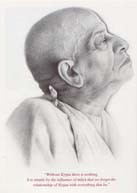
SRILA PRABHUPADA'S QUOTE OF THE DAY
Devotee means very liberal and kind
to everyone, always gentleman under all kinds of conditions of life.
December 10, 1972
Sign-up to receive these quote HERE:
mailto:haribol@pacific.net.sg

Bhaktivedanta Vedabase Network ...
http://vedabase.net/


The Scientific - Mathematical
Proof for God's existence:
http://geocities.com/sector114

http://robot-hosting.com/php/login_nicholas.html
user name = guest
password = guest
(Collection of philosophical and mathematical proofs
for existence of God can be found in this site.)

Scientifically Philosophical Books for the layman
 ...
... ...
...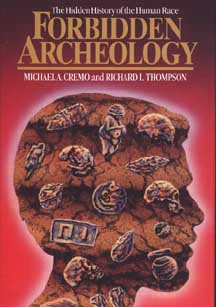 ...
...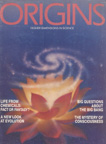
Click on any of these books to read more about them and where to get
a copy
or contact your local temple for purchases
sample of Life
comes from Life HERE.pdf

Lotus Imprints - Preserving Prabhupada's Legacy - The
Publishing House of Hari Sauri dasa
http://www.lotusimprints.com/

Quotes from Shastra - scriptures
View using Balaram font
The Advent of Bhagavad Gita

This is the annirversary day commemorating
the day that Srimad Bhagavad Gita was spoken by Lord Sri Krishna to His
dearmost devotee Arjuna at the place now known as Jyotisar Tirtha amid
the waring families of the Kurus and the Pandavas at Kurukshetra. If one
wishes one can still go and visit that place and see the monument erected
there with Krishna as Parthasarati (the chariot driver) and Arjuna the
warrior on their chariot. It is claimed by the ashram who maintain the
shrine that the tree that is next to Them is a continum growth of the original
tree witness that was there at the actual day of speaking.
Traditionally devotees come to Kurukshetra
(Dharmakshetra) and recite Bhagavad Gita from early morning until the next
morning, perform arati to Bhagavad Gita and to Krishna and Arjuna upon
the chariot, offer lamps 'deep daan' at Brahma Sarovar, shloka recitals,
shobha yatras and seminars on the significance of the Gita today.
Devotees who cannot get to Jyotisar Tirtha remember the
blessed event by reciting Bhagavad Gita, performing Bhagavad Gita ahuti
of each verse or selected chapters into the sacred fire, and discussing
the subject matter of Bhagavad Gita in the association of devotees. Distribution
of Bhagavad Gitas' on this day is also a very auspicious activity to perform.
Remembering the Scene:
The Pandavas army took the western side of the battlefield
of Kurukshetra. They were facing the east. Their army was stationed near
a lake. A white royal umbrella was seen in the Kauravas army. The soldiers
started warning up at the thought of the battle ahead. Blowing of conches
raised a great tumult and beating of drums and many other instruments were
sounded to announce the readiness for the war. Excitement was building
up.

The warriors of both the sides met and settled the rules
of the war. Only equals will fight in personal duels. Those who surrender,
there lives will be spared, No charioteer, animal, or servants who were
not soldiers were to be attacked. These and some other rules that were
usual in a Dharma-Yuddha or a righteous war were finalised and both the
sides agreed to abide by them.

On the eve of the war, sage Vyasa visited the palace of
Dhritarastra, who was his son, now the terrible days are in store. All
your sons and the kings will be killed soon. This is settled by fate. It
is ordained so, do not be sorry. I shall grant you your eyesight so that
you may witness the war. Dhritarastra was shaken by the stark words of
the sage. He said, ‘My lord, I have been blind all my life. I do not want
to see my sons dying in the battlefield. If someone can give me an account
of the war as it unfolds, I shall be happy. Vyasa said, Sanjaya would get
the power to see everything that happens in the war. He will be able to
see during the day as well as in the night. He shall be even able to know
the thoughts of the persons engaged in the war. He shall not be tired or
exhausted. The omens are all against the Kauravas." Saying this the great
sage departed.
(After this the entire account of the war is as related
by Sanjaya to the blind king Dhritarastra)
Duryodhana was busy arranging his troops in a battle array.
He told Dussashan, ‘take care to protect our grandsire, Bhishma. All the
chariots and warriors should be placed in such a position to Bhishma. He
alone is capable of destroying the entire army of the Pandavas led by Dhristadhyumna.
We should pay special attentions to kill Shikhandi. He could be a source
of danger to Bhishma.
Then (one Akshauhini of Army comprises of 21870 chariots,
21870 elephants, 65610 horses and 109350 men.) akshauhinis of the Kauravas
army was arranged in Vyuha (battle array) and one akshauhini was under
the direct control of Bhishma. Bhishma chariot was white-silver coloured,
it was driven by white horses and his flag was golden, bearing his personal
insignia. The Sun was rising in a golden dawn. Bhishma spoke to his soldiers,
"Today is a very auspicious day. The gates of heavens are open to all the
Kshatriyas who will be fortunate to die in the battle. It is not beckoning
of a Kshatriya to die in bed or of sickness. Battlefield is the only glorious
place to die. Without thinking about tomorrow do your best to win the war.
Karna was the only warrior who had not joined the war. Bhishma chief body
guard was Ashwathama, who was supported by seven more warriors. Salya and
Bhurishrava were among them. Duryodhana’s banner was proudly fixed a top
his chariot.
Looking at the vast army of the Kauravas, Yudhisthira
said to Arjuna. Their army is so huge. They have eleven akshauhinis against
them we have only seven. How best can be arrange our army in battle formation.
Bhishma is quite formidable. Arjuna said, that he would arrange the army
in a ‘Vyuha’ named ‘Vajra’. This was the favourite arrangement of lord
Indra. Dhristadhyumna was in the centre of the army. Bhima, Yudhisthira,
protected him and Arjuna supported Shikhandi. The most prominent banner
in the Pandava side was that of Arjuna, having lord Hanumana himself on
it, driven by Krishna, having white horses. All those who knew the reality,
saluted Krishna. Krishna said to Arjuna, ‘See the army of the Kauravas,
led by your old grandsire. The lion among the Kaurava heroes, is your first
victim.





courtesy BBT Int.

This is the anniversary day commemorating
the day that Srimad Bhagavad Gita was spoken by Lord Sri Krishna to His
dearmost devotee Arjuna at the place now known as Jyotisar Tirtha amid
the waring families of the Kurus and the Pandavas at Kurukshetra. If one
wishes one can still go and visit that place and see the monument erected
there with Krishna as Parthasarati (the chariot driver) and Arjuna the
warrior on their chariot. It is claimed by the ashram who maintain the
shrine that the tree that is next to Them is a continum growth of the original
tree witness that was there at the actual day of speaking.
Traditionally devotees come to Kurukshetra (Dharmakshetra)
and recite Bhagavad Gita from early morning until the next morning, perform
arati to Bhagavad Gita and to Krishna and Arjuna upon the chariot, offer
lamps 'deep daan' at Brahma Sarovar, shloka recitals, shobha yatras and
seminars on the significance of the Gita today.
Devotees who cannot get to Jyotisar Tirtha remember the
blessed event by reciting Bhagavad Gita, performing Bhagavad Gita ahuti
of each verse or selected chapters into the sacred fire, and discussing
the subject matter of Bhagavad Gita in the association of devotees. Distribution
of Bhagavad Gitas' on this day is also a very auspicious activity to perform.
What is the Bhagavad Gita?
The Bhagavad Gita(BG) was spoken by Sri Krishna to His
friend and disciple, Arjuna at the beginning of the epic war, Mahabharata.
BG provides the concise conclusion of the millions of verses in all the
Vedic scriptures. In just eighteen chapters containing seven hundred verse,
Sri Krishna answers all questions about the duty of the living entity.
In glorifying the BG, Lord Shiva says in the Gita Mahatmya (Padma Purana)
that it is sufficient to lead one to liberation.
How should one read the BG?
The BG should be studied in the same mood as it was heard
by Arjuna. Sri Krishna declares that He is revealing this most confidential
knowledge to Arjuna because is not envious and He is a friend. So one must
read and understand the BG in the mood of at least theoretically accepting
the position of Krishna as God. This knowledge is never revealed to one
who reads it in a challenging and speculative mood.
Owing to the universal message in the BG, many people
take to it instinctively. Unfortunately its importance has also given rise
to many people speculating and misinterpreting it. In order to protect
the trusting people from this kind of cheating, Sri Krishna stresses the
importance of Paramapara (disciplic succession) and Guru (spiritual master)
in receiving the knowledge of the BG.
Who should read the BG?
The BG is often referred to as the "Handbook for humanity".
Never in the BG has Sri Krishna restricted the scope of the BG to Hindus
or Indians. It is completely non-denominational, meant for any one inquiring
about his reason for existence. Indeed many people following Christianity
or Islam get a much better perspective of their own religion after reading
the BG and are able t o follow their religions with greater conviction.
What is Purpose of the BG?
The BG was spoken to guide the conditioned soul on the
path of the spiritual advancement. It is presented as principle and details.
The dominating principle of the BG is to develop God consciousness. In
the details, Sri Krishna explains three primary ways of doing this and
then further expands on these paths. He then relates them to each other
and brings forth the single most effective path for returning back to God
What are the three paths?
These paths are explained as yoga. The Sanskrit word
"yoga" means connecting to the absolute, and it is in this context that
the word yoga is used in the BG.
The three paths given by Sri Krishna are Karma yoga, Jnana
yoga and Bhakti yoga. The first six chapters primarily discuss Karma yoga,
liberation by performing prescribed activities. The last six chapters primarily
talk about Jnana yoga, liberation by worshipping the Lord through one's
intelligence. Ensconced between these two "protective" covers, like a pearl
in the oyster, in the middle six chapters, Krishna reveals the most confidential
of all knowledge, Bhakti yoga, the path of pure, unalloyed devotional service.
He declares this to be the highest, the easiest and the fastest path to
Him, and for one who is fortunate to embark on it, the binding illusions
of Maya are dispelled in no time.
What is Karma yoga?
A person situated in Karma yoga executes one's prescribed
duties. These duties are as prescribed by the Varnashrama system created
By Krishna through the Vedas. According to one's ability and inclination,
a person may acquires a particular varna. He may become a Brahaman (teacher,
guide), Ksatriya (administrator, warrior), Vaishya (merchant, farmer) or
Sudra (worker). According to his situation he lives in one of the four
ashrams: Brahamacari (student), Grahastha (married), Vanaprastha (retired)
and Sannyasa (detached). The eight fold Varnashram system is created to
allow one to be aware of his prescribed duties and execute them properly.
It is important to note here is that the BG stresses that a varna is acquired
by one's ability and inclination, never by birth. So in the BG, there is
no support of the "caste-system" prevalent in India. The Varnashram system
appears naturally in all societies over the world.
Performing prescribed duties will earn a person much pious
credit, but it will also continue to bind him to the material world. So
Karma can be "sakarma" (done in anticipation of enjoying its fruits) or
"nishkarma" (detached from the results). In both cases a person is attached
to performing the activity. However, when a person performs activities
only for the pleasure of the Lord, he has reached the stage of Bhakti.
For instance Sadhna (japa, arati, kirtan) are activities performed with
no material motives, simply to glorify or remember the Lord. Thus Karma
yoga can be used to elevate one self to the position of Bhakti yoga by
first performing prescribed activities, then renouncing the fruits of the
activities to Krishna and finally by renouncing the activity in itself
to Krishna.
What is Bhakti yoga?
The path of devotion is described as the most confidential
path back to Godhead. It is described as the "elevator" approach to Krishna
as opposed to all the other "staircase" paths. The essence of the Bhakti
yoga is summarized by Sri Krishna in Chapter 9, Verse 34, as follows: "Engage
your mind always in thinking of Me, become My devotee, offer obeisances
to Me and worship Me. Being completely absorbed in Me, surely you will
come to Me."
This verse, often considered to be the summary verse of
the entire BG, contains the essence of the existence of a spirit soul.
In the material world, trapped in the illusory sense of identifying with
the body and its extensions, a spirit soul remains forever bewildered by
the duality of existence. However by simply surrendering to Krishna, understanding
Him to be the original, primeval cause of all causes and thus worshipping
Him without any desires of material benefit, one can easily go back to
Him.
Bhakti yoga does not mean inactivity. Indeed a bhakta
is most active, for he sees all his activities now in relation to the Supreme.
But he is detached from the activity and the fruits of the activity, neither
happy in success nor distressed in failure, understanding that all this
is ultimately for Krishna and coming from Him only.
What is Jnana yoga?
In the Jnana section Krishna elaborates about the five
factors of existence: Isavara (God), Jivatma (Soul), Kala (Time), Karma
(actions) and Prakriti (Nature). He explains that while Kala, Prakriti,
Jiva and Isavara are eternal, Karama is not. As long as one is involved
in fruitive activities, the cycle of Karma, performed in one of the three
modes of material Nature (goodness, passion, ignorance) is binding. For
every action, good or bad, there is a reaction. This cycle can only be
broken by performing devotional service, since that does not have any reactions,
good or bad. In this stage the person transcends the material plane of
existence and enters into the spiritual realm.
When Krishna explains the path of spiritual advancement
by knowledge, Arjuna gets confused between the Karma (action) and Jnana
(inaction). Krishna explains that one must strive for activities performed
in knowledge of Him, which will ultimately lead to Bhakti. Philosophy without
faith is speculation, and faith without philosophy is rituals. The two
must complement each other. Thus, Krishna once again stresses that the
ultimate goal of all transcendentalists is Him. They may reach Him directly
by Bhakti or first reach Bhakti through Karma or Jnana.
Why has Krishna given alternatives?
A confusing aspect of the BG is the fact that while acknowledging
the superiority of Bhakti yoga. Krishna spends considerable time talking
about Jnana and Karma yoga. He even speaks briefly about the eight fold
astanga yoga process followed by the mystics. For many people this is very
confusing if not apparently contradictory.
In reality. Krishna is offering some thing for every one
according to their levels of advancement and inclination. As God, He does
not interfere with the free will of a living entity. But as the most compassionate
well wisher He wants every one to leave this material world of misery and
return to the original spiritual abode.
So, for a person attracted to action, there is Karma yoga.
For the intellectual there is Jnana yoga. For the mystic there is astanga
yoga. The BG meets the person at the level they are in and gradually
elevates them to the platform where they become qualified to execute Bhakti
yoga, pure devotional service. A very few fortunate souls, by the causeless
mercy of Krishna and His devotees, are able to take directly to Bhakti,
and for them the way back to Godhead is quick and easy.
Conclusion
We hope that these points address your interests and
motivate you to read the Bhagavad Gita As It Is.
Read Bhagavad Gita On-line HERE: http://www.asitis.com/

Bhagavad Gita Pictures - Copyright ©2005 The Bhaktivedanta Book
Trust
International, on the web at http://www.krishna.com.
Used with permission.
Courtesy of http://www.vedabase.com/
used
with permission

All pictures from Srimad Bhagavatam and Iskcon works - Copyright ©2005
The Bhaktivedanta Book Trust
International, on the web at .http://www.krishna.com/.
Used with permission.

Xmas Madness
Here we are taking a non-sentimental look at "the festive
season" where in the name of religiosity millions of innocent animals are
slaughtered; where alcoholism and drugs are used by millions in "celebration";
where mindless frivolity, gambling and other time wasting activities are
rife; and where numerous unwanted by-products of loose sexual encounters
take their conception, to burden society, and add to the social bill the
rest of us carry.
Accordingly we must understand what the authorised
scripture calls the modes of nature that such "festivities" come under.
Factually what value these festivals hold to benefit human society in any
way, if any. Also whose "culture" they belong
to... (here we use this word culture in its loosest possible meaning).
Ancient solstice meaning
Christmas, ironically, antedates the Nativity of Christ,
and December 25th is a fudge. In the third century A.D. the Church fathers
chose that day as Christ’s birthday, with good reason. It happens to fall
approximately on the Northern Hemisphere’s Winter Solstice, and December
25th (Midwinter’s Day) which has been from time immemorial a day sacred
to the rebirth of the light of the sun in the depths of winter.
This day was the Festival of Natalis Sol Invictus
(the Birth of the Undefeated Sun) in ancient Rome. Ancient peoples of the
region also commemorated the Babylonian Queen of Heaven, Osiris in Egypt,
Dionysus, Helios, Adonis, the Celtic Cernunnos, the Syrian Baal, Attis,
Mithras, Balder and the Norse goddess Frey - all celebrated on the ancient
Winter Solstice, and mostly solar saviours and dying gods. Most of these
deities were given similar titles: the Light of the World, Sun of Righteousness,
and Saviour. Among these huge celebrations the optimists within the newly
founded Christian Church decided to cash in on the festivities and usurp
them for their own end in swinging their influence toward the celebration
of Jesus the Christ's birth.
As you can testify, it was a great success for them,
so much so that through their zealousness the original events were eclipsed
into near oblivion - who of us learned about them at school, or in our
religious instruction? No they were purposefully hidden, as has so much
been over the past several hundred years by missionaries obviously so inferior
that they had to erase all other cultures world wide to have their new
cult of Christianity stand alone as "the one true way".
By the way did you know that Santa Claus used to wear
green until some advertising materialist decided to change the color scheme
on behalf of Coca Cola in the 1930’s? Commercialism at its "best".............
The original nature of the event that has become known
as XMAS has been further brought out in the following Xmas
pages that reveal how it has degenerated. Get
an in-depth view of the origin of Xmas and it's present form at this other
Xmas page HERE
All the details of Christmas from different cultures around
the world have been compiled by Pip Wilson in his Almanac HERE
 The
Pope begs for forgiveness for sins that the Church has done against other
cultures and religions:
The
Pope begs for forgiveness for sins that the Church has done against other
cultures and religions:
 St
Nick - Santa Claus page
St
Nick - Santa Claus page
Christmas Catching On in India
Source: http://www.hinduism-today.com/1995/11/1995-11-14.html
NEW DELHI, INDIA, December 24, 2002: A recent New York Times article
describes Hindus in India taking to the Christian holiday of Christmas.
While devout Hindus never start their day without lighting at least an
incense stick and offering prayers to their chosen Hindu deity, come December
many begin planning for Christmas. "It doesn't matter if I'm a Hindu. Christmas
stands for love, affection, sharing, renewing family bonds. It's a festival
for everyone," said one of the Hindus interviewed, as she shopped for tree
decorations at New Delhi's upscale Ansal Plaza mall. Not surprisingly are
the many echoes of complaints heard in the West about Christmas becoming
commercialized. The popularity of Christmas does not extend to the religious
themes associated with the festival. It's only Christians who attend midnight
church services on Christmas Eve and nativity scenes can be seen only in
Christian institutions and churches. For a Hindu perspective during this
season of worldwide celebrations, see "source" above for a description
of Pancha Ganapati, a modern festival or "Hindu Christmas," that is a time
of gift giving and home religious observances honoring a family's love
and togetherness, community harmony and cultural celebrations.
This article was by courtesy of http://www.HinduismToday.com/
 Little-Known Stories
Show Christmas Has Some Contentious - and Pagan - Origins - From
the Religion News Service
Little-Known Stories
Show Christmas Has Some Contentious - and Pagan - Origins - From
the Religion News Service
USA, December 24, 2003: This interesting piece on the origins of Christmas
appeared in the Religion News Service and is written by Yvonne Betowt:
Did you know Alabama was the first state to declare Christmas an official
holiday? That happened in 1836, 71 years before the last state -- Oklahoma
-- followed suit in 1907. Christmas is the only legal national religious
holiday in the United States. While it has been less than 100 years since
all 50 states recognized Christmas as an official holiday, Dec. 25 has
been celebrated for centuries by Christians as Jesus' birthday. But until
245 A.D., when a group of scholars tried to determine the date of Christmas,
the question had never been addressed, according to a 1995 article by Victor
M. Parachin in the Christian Reader. However, the project by the early
church theologians was denounced by a church council, which thought it
wrong to celebrate Jesus' birthday "as though he were a King Pharaoh."
That didn't prevent the scholar-theologians from continuing their quest
to determine the day Jesus was born. They originally listed four dates
-- Jan. 1 and 6, March 25 and May 20 -- as possibilities, according to
Parachin's research.
It wasn't until 349 A.D. that Dec. 25 was formally chosen as Christmas
Day by Pope Julius. The date was already celebrated as the Natalis Solis
Invicti in honor of the sun god, Mithras, by Roman citizens. They decorated
their homes with greenery, exchanged gifts and gathered for festive meals
on that date, observed just after the winter solstice. Many scholars believe
Pope Julius picked Dec. 25 as Christmas Day to convert followers of Mithras,
in addition to providing Christians with an opportunity to celebrate Jesus'
birth. Christmas continued, however, to be a contentious issue.
In 17th century England and early America, English Puritans said the
Bible offered no clear basis for celebrating Jesus' birth. In 1643, the
English Parliament outlawed not only Christmas, but Easter and other Christian
celebrations. But by 1660, Christmas had become such a popular holiday,
the law was repealed. After the Pilgrims arrived at Plymouth, Mass., in
1620, their English misgivings about Christmas celebrations continued.
In 1659, people in Massachusetts who celebrated Christmas were fined. The
law was struck down in 1681 because the popularity of observing Christmas
had grown immensely.
However, Christian groups remained divided over whether Christmas should
be celebrated because of its ties to pagan observances. The Lutherans,
Dutch Reformed, Catholic and Anglican churches forged ahead with the celebrations
while the Baptists, Presbyterians, Quakers and Puritans continued to rail
against it. Even today, some Christian groups, including many Churches
of Christ and Seventh-day Adventists, do not acknowledge Christmas as a
religious observance.
Satguru Sivaya Subramuniyaswami created the modern-day festival of Pancha
Ganapati to coincide with the Christmas celebrations for Hindus living
in the West. It's a means to participate in the festive season without
the trappings of another religion's holiday. Click http://www.hinduismtoday.com/archives/1995/11/1995-11-14.shtml
for the details.
This article is by courtesy of http://www.HinduismToday.com/
(24th December 2003)
 Vegetarians
over the Holiday period - looking after them:
Vegetarians
over the Holiday period - looking after them:
 Xmas
Guide for devotees:
Xmas
Guide for devotees:
 Xmas
- a modern page that completely misses the point all about Christmas:
Xmas
- a modern page that completely misses the point all about Christmas:
 Survival
Guide to the Holiday Season:
Survival
Guide to the Holiday Season:
 THE
HOLIDAY FESTIVAL - talk by HH Giriraj Swami
THE
HOLIDAY FESTIVAL - talk by HH Giriraj Swami
 Teen
Vegetarians at Xmas
Teen
Vegetarians at Xmas
 Recipes
4 Xmas
Recipes
4 Xmas
 International
Vegetarian Union's list of Seasonal dishes - some have eggs, garlic
and onion, many are adaptable:
International
Vegetarian Union's list of Seasonal dishes - some have eggs, garlic
and onion, many are adaptable:
 Vegan
Xmas or Yule - some have onion, garlic, mushrooms too:
Vegan
Xmas or Yule - some have onion, garlic, mushrooms too:
 "Culture
- Brahminical or Animal"
"Culture
- Brahminical or Animal"
 Hanukkah
- the Jewish festival of lights over the Xmas period:
Hanukkah
- the Jewish festival of lights over the Xmas period:
 Ramadan
- the Moslem religious observation, explanation page:
Ramadan
- the Moslem religious observation, explanation page:
 Kwanza
- the African-American cultural hereditary observation:
Kwanza
- the African-American cultural hereditary observation:
 Anti-Xmas
page:
Anti-Xmas
page:
 Online
Christmas Games:
Online
Christmas Games:
 PROOF
FROM THE BIBLE-- CHRIST WAS NOT BORN ON DECEMBER 25TH
PROOF
FROM THE BIBLE-- CHRIST WAS NOT BORN ON DECEMBER 25TH
 A
look at the Western Indologists - their motive and intent:
A
look at the Western Indologists - their motive and intent:
 The
Western Scientific Faculty:
The
Western Scientific Faculty:
 Freud
and his psychosis:
Freud
and his psychosis:
 The
myth of slaughterhouse civilization:
The
myth of slaughterhouse civilization:
 History
& Source of Veda:
History
& Source of Veda:
 Vegetarianism
and Beyond:
Vegetarianism
and Beyond:
 Bhaktivedanta
Science Institute:
Bhaktivedanta
Science Institute:
 Darwin
Pages:
Darwin
Pages:
 VedaBase
- A folio of every recorded word written or spoken by the Founder Acarya
of Iskcon:
VedaBase
- A folio of every recorded word written or spoken by the Founder Acarya
of Iskcon:
 Mayapur
Institute of Higher Education:
Mayapur
Institute of Higher Education:
 Vedik
World Heritage
Vedik
World Heritage
 Index
of Vedik links
Index
of Vedik links









![]()
![]()
![]()
![]()

![]()
![]()
![]()
![]()

![]()
![]()
![]()
![]()





















 Little-Known Stories
Show Christmas Has Some Contentious - and Pagan - Origins - From
the Religion News Service
Little-Known Stories
Show Christmas Has Some Contentious - and Pagan - Origins - From
the Religion News Service
